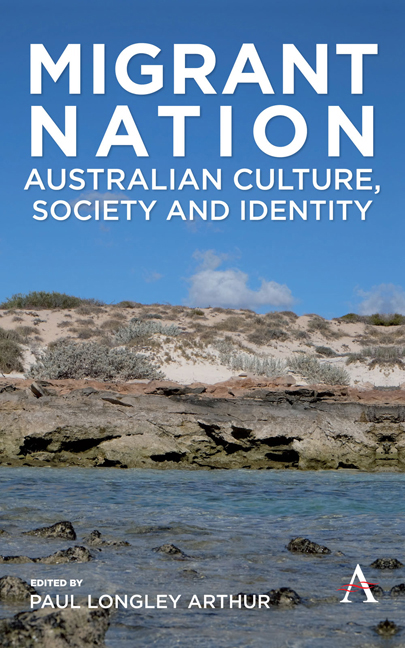Book contents
- Frontmatter
- Contents
- List of Figures
- 1 Introduction: Transcultural Studies in Australian Identity
- 2 Remembering Aboriginal Sydney
- 3 Files and Aboriginal Lives: Biographies from an Archive
- 4 Writing, Femininity and Colonialism: Judith Wright, Hélène Cixous and Marie Cardinal
- 5 The Staging of Social Policy: The Photographing of Post-War British Child Migrants
- 6 Writing Home from China: Charles Allen's Transnational Childhood
- 7 Australian? Autobiography? Citizenship, Postnational Self-Identity and the Politics of Belonging
- 8 A Nikkei Australian Story: Legacy of the Pacific War
- 9 Displaced Persons (1947–52) in Australia: Memory in Autobiography
- 10 Between Utopia and Autobiography: Migrant Narratives in Australia
- 11 Vietnamese–Australian Life Writing and Integration: The Magazine for Multicultural and Vietnamese Issues
- 12 Heroes, Legends and Divas: Framing Famous Lives in Australia
- List of Contributors
- Index
9 - Displaced Persons (1947–52) in Australia: Memory in Autobiography
Published online by Cambridge University Press: 10 May 2018
- Frontmatter
- Contents
- List of Figures
- 1 Introduction: Transcultural Studies in Australian Identity
- 2 Remembering Aboriginal Sydney
- 3 Files and Aboriginal Lives: Biographies from an Archive
- 4 Writing, Femininity and Colonialism: Judith Wright, Hélène Cixous and Marie Cardinal
- 5 The Staging of Social Policy: The Photographing of Post-War British Child Migrants
- 6 Writing Home from China: Charles Allen's Transnational Childhood
- 7 Australian? Autobiography? Citizenship, Postnational Self-Identity and the Politics of Belonging
- 8 A Nikkei Australian Story: Legacy of the Pacific War
- 9 Displaced Persons (1947–52) in Australia: Memory in Autobiography
- 10 Between Utopia and Autobiography: Migrant Narratives in Australia
- 11 Vietnamese–Australian Life Writing and Integration: The Magazine for Multicultural and Vietnamese Issues
- 12 Heroes, Legends and Divas: Framing Famous Lives in Australia
- List of Contributors
- Index
Summary
Are all our lives’ stories only to be told at our funerals? […] When this generation dies, no one will remember our story. There is no written record.
There is no book that tells the story as a whole.
Zabukovec 1993, 376Almost 171,000 post-war Displaced Persons (DPs) – predominantly Central and Eastern Europeans – arrived in Australia between 1947 and 1952 as International Refugee Organisation– sponsored refugees. These DPs came to Australia with little documentary evidence of their lives in Europe. They also soon found that telling their stories was not encouraged in an Australian society intent on assimilation. DP narratives were either co-opted to fit into government publicists’ and media's representations or ignored, or became part of a diasporic literature. DP experiences have been retrospectively selfrepresented – ‘remembered’ – through mainstream media such as novels and memoirs. The advent of multiculturalism particularly encouraged forms of migrant life writing. In this chapter, we are concerned with a history of DP collective memory, such as it exists. Historian Wulf Kansteiner has described collective memory as ‘a complex process of cultural production and consumption that acknowledges the persistence of cultural traditions as well as the ingenuity of memory makers and the subversive interests of memory consumers’ (Kansteiner 2002, 179). Aiming to explore written and spoken forms of self-representation, I discuss a broad range of DP stories that have influenced Australian culture as well as affecting second and third generations in their search for information and negotiation of identity.
Sonia Mycak's comprehensive empirical study of DP literature has found that a lively literary life existed from the immediate post-war years in Australian DP communities, with distinctive literary cultures, writers’ clubs and associations, recitals and festivals, competitions and the production of periodicals and books (Mycak 2003, 19). Mycak also found that most of this literary output ‘remain[ed] hidden within the many diverse ethnic communities’ (Mycak 2006, 275). Most DPs did not write in English and did not draw from themes of life in Australia. In the Ukrainian community, for example, the perception was that the ‘present geographical local[e] of the community’ was ‘accidental and temporary’, and that ‘all experience connected with this location’ was ‘inauthentic and undeserving of serious treatment’ (Pavlyshyn 1992, 65).
- Type
- Chapter
- Information
- Migrant NationAustralian Culture, Society and Identity, pp. 151 - 176Publisher: Anthem PressPrint publication year: 2017



